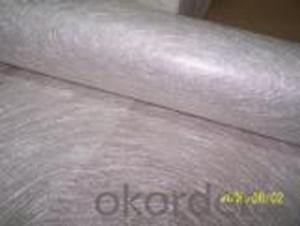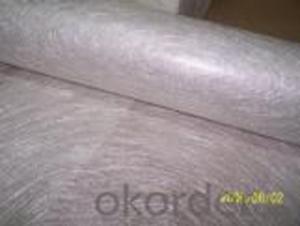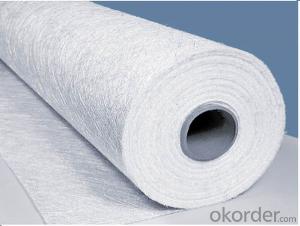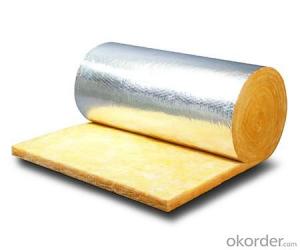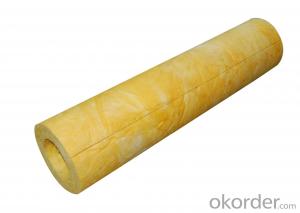E-glass Stitch chopped strand mat 380gsm,50-2400mm
- Loading Port:
- Shanghai
- Payment Terms:
- TT or LC
- Min Order Qty:
- 2000 m²
- Supply Capability:
- 20000 m²/month
OKorder Service Pledge
OKorder Financial Service
You Might Also Like
Description
Fiberglass stitch chopped strand mat is the mat made of fiberglass roving which is at first be cut into certain length and evenly unfolded in all directions and then stitched with polyester yarn.
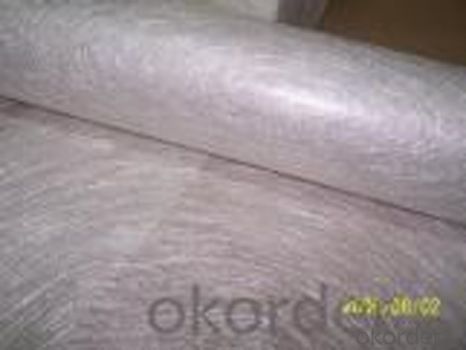
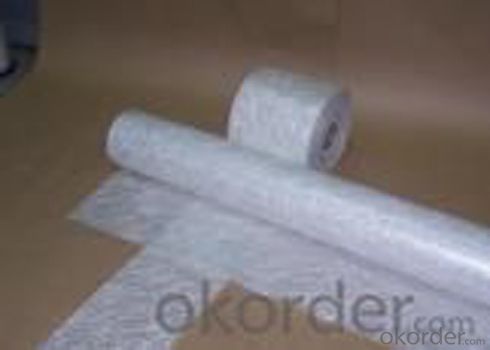
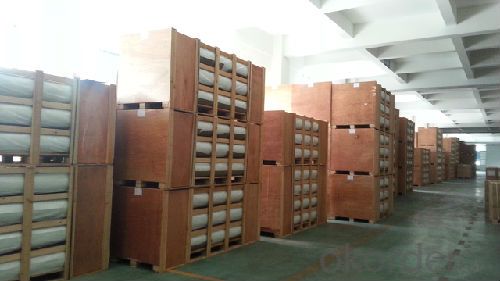
Products Traits
• Fiberglass no certain direction, good homogeneity.
• No powder or emulsion; sink quickly and easy to operate
• High tensile strength, easy to operate
• Good impact strength of finished products
Applications
Mainly be used as reinforced materials in the composite material industry.
• Matrix: unsaturated polyester resin, vinyl ester resin, epoxy resin and phenolic resin etc.
• Craft: winding, pultrusion, RTM, molded, hand lay up, etc.
• Ultimate products: Liner layer of tube, pultruded profiles, FRP body of boat, insulation board
Specifications
specifications | Fibre type | Areal weight | Width |
(g/㎡) | (mm) | ||
EMK 300 | E-Glass | 300 | 50-2400 |
EMK380 | E-Glass | 380 | 50-2400 |
EMK450 | E-Glass | 450 | 50-2400 |
CMK 300 | C-Glass | 300 | 50-2400 |
CMK380 | C-Glass | 380 | 50-2400 |
CMK450 | C-Glass | 450 | 50-2400 |
Packaging: Wrapped in PVC and placed within a cardboard carton. | |||
FAQ
1.Which country do you mainly export to?
A: Our products are very popular in Mid East, India, South East Asia, Latin America, Africa.
2.Pacage
Be wound onto a paper tube The roll is wrapped up with plastic film,and then packed in a cardboard box. The rolls can be vertically or horizontally placed. For transportation, the rolls can be loaded into a container directly or on pallets.
- Q:Can fiberglass mat tissue be used for boat building?
- Yes, fiberglass mat tissue can be used for boat building. Fiberglass mat tissue is a lightweight and versatile material that is commonly used in the construction of boats. It is made up of thin strands of fiberglass woven together to form a mat-like structure. This material is known for its high strength-to-weight ratio, making it an ideal choice for boat builders. Fiberglass mat tissue is often used in boat building to reinforce the structure and provide added strength. It can be applied to the hull, deck, or other parts of the boat to enhance its durability and resistance to impact. Additionally, it can be used to create a smooth and even surface, which is important for achieving a professional finish. One of the advantages of using fiberglass mat tissue in boat building is its ease of application. It can be easily cut to size and molded to fit the desired shape, allowing for flexibility and customization. It can also be easily layered with other materials, such as epoxy resin, to create a strong and reliable composite. Furthermore, fiberglass mat tissue is highly resistant to water and corrosion, making it suitable for marine environments. It is also known for its excellent thermal and electrical insulation properties, which are beneficial for boat builders. In conclusion, fiberglass mat tissue can indeed be used for boat building. Its lightweight, high strength, and resistance to water and corrosion make it a reliable and popular choice among boat builders.
- Q:Can fiberglass mat tissue be used for ballistic protection?
- While fiberglass mat tissue can offer some degree of ballistic protection, it may not provide the same level of safety as materials specifically created for this purpose. Its exceptional strength and resistance to heat make it ideal for insulation, reinforcement, and fire resistance applications. Nevertheless, when it comes to shielding against ballistic threats, there are specialized materials engineered to endure the impact of bullets or projectiles. These materials, such as aramid fibers (like Kevlar) or ultra-high-molecular-weight polyethylene fibers (like Dyneema), are far more effective in delivering superior ballistic protection. Therefore, if the primary concern is ballistic protection, it is advisable to opt for materials designed explicitly for this purpose rather than relying solely on fiberglass mat tissue.
- Q:Can fiberglass mat tissue be used for insulation?
- Fiberglass mat tissue can indeed be utilized for insulation purposes. It finds widespread application within the construction sector, serving as an effective material for thermal and sound insulation. Comprised of delicate glass fibers intricately woven into a mat-like formation, this tissue structure effectively captures air, establishing a barrier that minimizes heat transfer. Consequently, it ensures insulated spaces retain a pleasant temperature. Moreover, fiberglass mat tissue boasts resistance against moisture, fire, and pests, rendering it an excellent insulation option across diverse situations.
- Q:How is fiberglass mat tissue used in the production of pipes and tanks?
- Fiberglass mat tissue is used in the production of pipes and tanks as a reinforcement material. It is applied to the surface of the pipes or tanks to enhance their strength, durability, and resistance to corrosion. The mat tissue provides additional structural support and helps to prevent cracking and leakage, ensuring the longevity and reliability of the pipes and tanks.
- Q:How does fiberglass mat tissue compare to other insulation materials?
- Fiberglass mat tissue is a highly effective insulation material that offers several advantages over other insulation materials. Firstly, fiberglass mat tissue has excellent thermal insulation properties, which means it effectively prevents heat transfer and helps maintain a comfortable indoor temperature. This is particularly important in extreme climates where heat or cold can easily penetrate the building envelope. Additionally, fiberglass mat tissue is resistant to moisture, mold, and mildew, making it a durable and long-lasting insulation option. It does not absorb water, which helps to prevent the growth of mold and the degradation of the material over time. This is especially beneficial in humid environments or areas prone to moisture accumulation, such as basements or bathrooms. Furthermore, fiberglass mat tissue is non-combustible and has a high fire resistance rating. This makes it a safe choice for insulation, as it does not contribute to the spread of flames in case of a fire. It can also act as a barrier, preventing the fire from spreading to other areas of the building and offering occupants valuable time to evacuate. In terms of installation, fiberglass mat tissue is relatively easy to handle and install. It can be cut to fit any desired shape or size, allowing for flexibility during installation. It can also be used in various applications, including walls, floors, ceilings, and roofs, making it a versatile insulation material. Lastly, fiberglass mat tissue is an environmentally friendly option. It is made from recycled glass and sand, which helps reduce waste and conserve natural resources. It is also recyclable at the end of its lifespan, further minimizing its environmental impact. Overall, fiberglass mat tissue exhibits superior thermal insulation properties, durability, resistance to moisture and fire, ease of installation, and environmental sustainability, making it a highly favorable choice when compared to other insulation materials.
- Q:Does fiberglass mat tissue provide any mold resistance?
- While fiberglass mat tissue alone does not possess natural mold resistance, its combination with other mold-resistant materials and proper construction techniques can aid in preventing mold. The fiberglass mat tissue itself may not resist mold growth, but it can be employed as a strengthening layer in mold-resistant building materials like mold-resistant drywall or sheathing. These materials are specifically engineered to hinder the growth of mold and mildew by incorporating additives or coatings. It is also crucial to guarantee the correct installation and upkeep of these materials to minimize moisture accumulation and establish an unfavorable setting for mold to thrive.
- Q:Is fiberglass mat tissue resistant to pests and insects?
- Fiberglass mat tissue is generally not resistant to pests and insects. While fiberglass itself is not a food source for pests, the binders and resins used in the manufacturing process may attract certain insects. Additionally, small cracks or gaps in the fiberglass can provide entry points for pests. However, fiberglass mat tissue can be treated with specific chemicals or coatings to make it more resistant to pests and insects. It is recommended to consult with a professional or manufacturer to determine the best approach for pest and insect resistance in fiberglass mat tissue.
- Q:Does fiberglass mat tissue require any special maintenance after installation?
- After the installation of fiberglass mat tissue, it typically does not require any special maintenance. Fiberglass mat tissue is designed to be durable and resistant to wear and tear. It is also highly resistant to moisture, chemicals, and UV radiation, making it suitable for various applications such as roofing, insulation, and wall covering. However, it is recommended to inspect the fiberglass mat tissue periodically to ensure it remains in good condition. This can involve checking for any signs of damage, such as cracks, tears, or delamination. If any issues are found, they should be addressed promptly to prevent further damage. Additionally, it is important to follow the manufacturer's guidelines and recommendations for the specific type of fiberglass mat tissue used. This may include avoiding exposure to certain chemicals or using appropriate cleaning methods if necessary. Overall, while fiberglass mat tissue is generally low-maintenance, regular inspections and adherence to manufacturer's guidelines can help ensure its longevity and optimal performance.
- Q:Is fiberglass mat tissue suitable for agricultural applications?
- Yes, fiberglass mat tissue can be suitable for agricultural applications. It is commonly used in the agricultural industry for various purposes such as reinforcement for greenhouse structures, insulation for livestock housing, and even as a material for composting systems. Its durability, strength, and resistance to weathering make it a viable option for agricultural use.
- Q:Can fiberglass mat tissue be used in automotive manufacturing?
- Indeed, fiberglass mat tissue finds great utility in the realm of automotive manufacturing. Crafted from interwoven glass fibers bonded by a binder, this pliable and lightweight material serves a multitude of purposes within the automotive industry. It excels at reinforcing body panels, constructing structural components, and improving sound and heat insulation. An advantageous attribute of fiberglass mat tissue in the realm of automotive manufacturing lies in its remarkable strength-to-weight ratio. It bestows superb reinforcement capabilities upon the vehicle while adding minimal mass, rendering it an optimal selection for bolstering fuel efficiency and curbing emissions. Furthermore, fiberglass mat tissue boasts exceptional malleability, enabling effortless shaping and molding into intricate geometries requisite for automotive parts. This material readily reinforces regions susceptible to intense stress, including the roof, doors, and undercarriage, thereby augmenting the vehicle's overall robustness and endurance. Moreover, fiberglass mat tissue exhibits outstanding resistance to corrosion, chemicals, and extreme temperatures, engendering its suitability for deployment in diverse automotive environments. It also serves as an effective insulator against sound and heat, effectively abating noise and preserving a comfortable internal temperature. All in all, fiberglass mat tissue has emerged as a cherished resource in automotive manufacturing, owing to its lightweight, sturdy, moldable, and durable properties. The versatility and performance characteristics it embodies render it the preferred choice for numerous automotive manufacturers seeking to heighten the excellence and performance of their vehicles.
1. Manufacturer Overview |
|
|---|---|
| Location | |
| Year Established | |
| Annual Output Value | |
| Main Markets | |
| Company Certifications | |
2. Manufacturer Certificates |
|
|---|---|
| a) Certification Name | |
| Range | |
| Reference | |
| Validity Period | |
3. Manufacturer Capability |
|
|---|---|
| a)Trade Capacity | |
| Nearest Port | |
| Export Percentage | |
| No.of Employees in Trade Department | |
| Language Spoken: | |
| b)Factory Information | |
| Factory Size: | |
| No. of Production Lines | |
| Contract Manufacturing | |
| Product Price Range | |
Send your message to us
E-glass Stitch chopped strand mat 380gsm,50-2400mm
- Loading Port:
- Shanghai
- Payment Terms:
- TT or LC
- Min Order Qty:
- 2000 m²
- Supply Capability:
- 20000 m²/month
OKorder Service Pledge
OKorder Financial Service
Similar products
New products
Hot products
Hot Searches
Related keywords
